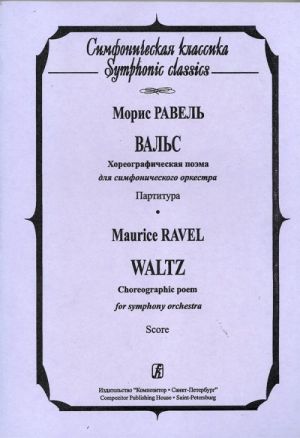The orchestral creation of Maurice Ravel (1875-1937) is truly considered to be the most conspicuous and unique phenomena amongst the French and world artifacts. Adhering to the impressionism aesthetic statements and simultaneously liberating his style off them, the composer managed to generate the alloy of both novelty and classic model in his orchestration skill. Ravel used to orchestrate his piano pieces (Pavana, My Mother Goose, Couperin's Tomb), so as the ones by Debussy, Musorgsky, Rimsky-Korsakov.
Once in 1919 the eminent Russian Maecenas Serge Diaghilev came to the great French musician with a suggestion. That would be the ballet inspired by the symphonic Waltz, having been not long ago mastered by Ravel but still left uncompleted. The score was ready to January 1, 1920. "I conceived this composition as the apotheosis to the Viennese waltz, the impetuous blizzard of which is engrossing every thing now and then," - noticed Ravel in his "Autobiography".
The material of the Waltz is mostly close to the utility genre music popular in Vienna (similar to Schubert, Brahms and J. Strauss). Actually this is a kind of choreography poem, where the front ground is given to logic and energetic evolution of psychological symphonic element inherent in Ravel.
145 mm x 205 mm
The orchestral creation of Maurice Ravel (1875-1937) is truly considered to be the most conspicuous and unique phenomena amongst the French and world artifacts. Adhering to the impressionism aesthetic statements and simultaneously liberating his style off them, the composer managed to generate the alloy of both novelty and classic model in his orchestration skill. Ravel used to orchestrate his piano pieces (Pavana, My Mother Goose, Couperin's Tomb), so as the ones by Debussy, Musorgsky, Rimsky-Korsakov.
Once in 1919 the eminent Russian Maecenas Serge Diaghilev came to the great French musician with a suggestion. That would be the ballet inspired by the symphonic Waltz, having been not long ago mastered by Ravel but still left uncompleted. The score was ready to January 1, 1920. "I conceived this composition as the apotheosis to the Viennese waltz, the impetuous blizzard of which is engrossing every thing now and then," - noticed Ravel in his "Autobiography".
The material of the Waltz is mostly close to the utility genre music popular in Vienna (similar to Schubert, Brahms and J. Strauss). Actually this is a kind of choreography poem, where the front ground is given to logic and energetic evolution of psychological symphonic element inherent in Ravel.
145 mm x 205 mm
Оркестровое творчество Мориса Равеля (1875-1937) - это поистине одно из ярчайших и наиболее самобытных явлений во французской и мировой музыкальной культуре. Продолжая традиции импрессионистской эстетики и в то же время освобождаясь из-под её влияния, композитор создал в искусстве оркестровки некий сплав новаторства и классических традиций, нашел неповторимые колориты. Равель переложил для симфонического оркестра много своих фортепианных пьес (Павана, Моя матушка гусыня, Гробница Куперена), а также произведения Дебюсси, Мусоргского, Римского-Корсакова.
В середине 1919 года знаменитый русский меценат Сергей Дягилев обратился к Морису Равелю с предложением создать балет на материале симфониче-ского Вальса, над которым композитор работал раньше, но не закончил. К 1 января 1920 года партитура была готова. В своей "Автобиографии" композитор пишет: "Я задумал это произведение как своего рода апофеоз венского вальса, который поглощается всё нарастающим сокрушительным вихрем".
Материал Вальса максимально приближен к бытовой венской музыке (в духе вальсов Шуберта, Брамса, И. Штрауса) и выстроен как хореографическая поэма, в которой на первый план выступают логика и динамика равелевского психологического симфонизма.
145 mm x 205 mm
Orkestrovoe tvorchestvo Morisa Ravelja (1875-1937) - eto poistine odno iz jarchajshikh i naibolee samobytnykh javlenij vo frantsuzskoj i mirovoj muzykalnoj kulture. Prodolzhaja traditsii impressionistskoj estetiki i v to zhe vremja osvobozhdajas iz-pod ejo vlijanija, kompozitor sozdal v iskusstve orkestrovki nekij splav novatorstva i klassicheskikh traditsij, nashel nepovtorimye kolority. Ravel perelozhil dlja simfonicheskogo orkestra mnogo svoikh fortepiannykh pes (Pavana, Moja matushka gusynja, Grobnitsa Kuperena), a takzhe proizvedenija Debjussi, Musorgskogo, Rimskogo-Korsakova.
V seredine 1919 goda znamenityj russkij metsenat Sergej Djagilev obratilsja k Morisu Ravelju s predlozheniem sozdat balet na materiale simfoniche-skogo Valsa, nad kotorym kompozitor rabotal ranshe, no ne zakonchil. K 1 janvarja 1920 goda partitura byla gotova. V svoej "Avtobiografii" kompozitor pishet: "Ja zadumal eto proizvedenie kak svoego roda apofeoz venskogo valsa, kotoryj pogloschaetsja vsjo narastajuschim sokrushitelnym vikhrem".
Material Valsa maksimalno priblizhen k bytovoj venskoj muzyke (v dukhe valsov Shuberta, Bramsa, I. Shtrausa) i vystroen kak khoreograficheskaja poema, v kotoroj na pervyj plan vystupajut logika i dinamika ravelevskogo psikhologicheskogo simfonizma.














